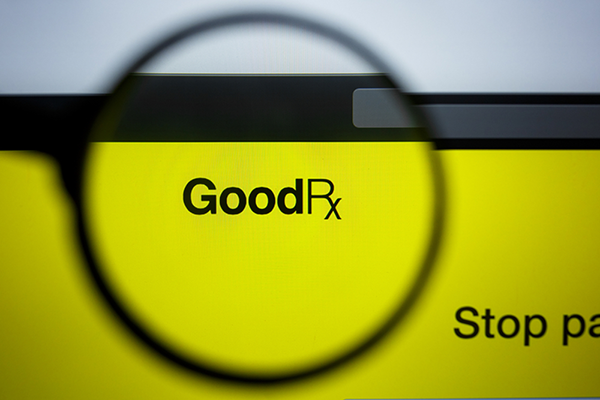 |
||||||||||||||
|
||||||||||||||
| GoodRx in Hot Water for Allegedly Sharing Consumer Data |
 |
| Another business fell prey to the privacy sinkhole. Its reach is far and does not hold a bias for anyone who fails to follow data ethics. In this case, the perpetrator, GoodRx, was fined $1.5 million for allegedly sharing users' health data for ad purposes. The FTC filed a complaint in U.S. District Court for the Northern District of California. It alleges that the drug company frequently violated consumers' privacy by sharing personal health information with advertisers or third parties. The district said GoodRx shared data that included users': • prescription medications • personal health conditions • personal contact information • unique advertising • persistent identifiers "In one campaign, which GoodRx ran in August 2019, GoodRx compiled lists of its users who purchased particular medications, uploaded their email addresses, phone numbers, and mobile advertising IDs to Facebook to identify their profiles, and labeled them by the medication they had purchased," the complaint states. "GoodRx then targeted these users with health-related advertisements." In addition, GoodRx allegedly failed to disclose to consumers how their data was shared. This was a direct violation of the Health Breach Notification Rule. According to GoodRx, the fine is unrelated to the current FTC lawsuit and stems from an old issue. The company stated, “it doesn't agree with the allegations and doesn't admit wrongdoing.” |
| The FTC is not pulling any punches when a publisher violates privacy regulations. Your business must be up to date with state and federal compliance laws. Compliance experts even stated that data breach litigation has increased over the past five years. GoodRx is a prime example. Samuel Levine, director of the FTC's Bureau of Consumer Protection, stated that the FTC "is serving notice that it will use all of its legal authority to protect American consumers' sensitive data from misuse and illegal exploitation." In addition, the consumer's distrust of the advertising and digital media industry is growing because of instances like this. Of course, ad ops professionals are working to mitigate their past mistakes, but bad outliers are tainting the industry's progress toward data ethics. This is why the ecosystem has seen a rise in tech, such as ad blockers. As of 2022, there were 290 million people using ad blockers, and some linked the rise of ad blockers to privacy. At first, consumers ran to ad blocking software because advertisers promised a more effortless user experience. Over the past three years, consumers increased the use of ad blockers because they felt advertisers did not respect their privacy. For publishers, this should raise a red flag. Your consumers demand respect for their privacy, and you are responsible for acknowledging that. Not only is it the ethical course of action, but in the end, it will affect your revenue. And the FTC may just come for you next if you’re not careful. |
| IAB’s CEO Wages War Against “Privacy Activists” and Apple at IAB’s Leadership Conference |
 |
| David Cohen, CEO at IAB, dropped a bomb in his speech at the annual IAB Leadership meeting. His verbal lashings left the attendees unscathed, but privacy regulators and Apple felt the sting of his words. Cohen’s words stem from a concern about the trajectory of the digital media industry. Specifically, he worries about increased regulation for ad and rev ops professionals, privacy ethics, and difficulty tracking and aggregating consumer data. He called out people he considers “extremists” and “opportunists” who “have made it their mission to cripple the advertising industry and eliminate it from the American economy and culture.” Sen. Ted Cruz, FTC Chairman Lina Khan, and Apple were all called out by name in his controversial speech. While I’m sure many industry professionals nodded in silent agreement with Cohen’s words, a string of critics — the ANA and 4A’s — called out his “polarizing political rhetoric.” Afterward, Cohen spoke with Marketing Brew to clarify his words. He said, “Outside of the sensationalism of the speech, the hope is that we have a pragmatic and practical approach to data use. And we are at least a decade behind in terms of a national data privacy law. My hope, at the end of the day, is that we get Washington to move, and we get all the large players to collaborate.” |
| The ad tech industry is at a crossroads, and Cohen’s speech is a prime example. At first, Cohen’s remarks made it seem like he was hesitant about upcoming privacy regulations, but after further clarification, it sounds like he wants to find common ground. Cohen’s issue concerns “privacy extremists” who paint “the ad-supported, free, and open internet with a broad brushstroke.” He feels that people like Sen. Cruz and Lina Khan are waging war against the ad tech industry at a time when the industry is working to self-regulate. There is a grain of truth to this because the ad tech industry is working hard to comply with data ethics. With the rise of privacy-first technology solutions such as ID solutions, Data Clean Rooms, and the push to use first-party data sets, the industry is working to aggregate consumer data. Is the ad tech industry ready to advance into the new digital age? We think so, but there is much work ahead. |
| The Trials & Tribulations of Programmatic Open Markets |
 |
| Recently, Digiday published multiple articles indicating that the programmatic open marketplaces are in a tough spot, delivering many challenges to advertisers and publishers alike. According to Digiday, the ad tech vendors are reducing the number of auctions they "listen to" while the "lowest quality" publishers are initiating a "ballooning" number of concurrent ones for the same impression, hoping to get the best possible price. This isn't a good situation for advertisers, who may compete against themselves for the same impressions. A few days later, Digiday reported that the average CPMs earned in the open market were declining. In January 2020, the average CPM in open RTB was $1.45; by January 2023, it fell to $1.21. Meanwhile, the average revenue per page view fell from 20 to 50%, according to publisher interviews conducted by Digiday. Publishers keen to monetize their revenue outside direct deals will fare better in private marketplaces. |
| These trends can worry publishers who rely on the open markets to monetize their sites, especially those that have laid off sales staff. But publishers are not defenseless. To Scott Messer, Principal & Founder of Messer Media, open marketplaces are “tremendously important for media and journalism.” While a glut of lower quality inventory is available in open marketplaces, he points out that "you can still buy great sites and sections there." He contends that CPMs are falling due to macroeconomic trends. Jana Meron, Strategic Advisor at Lioness Strategies, agrees that RTB inventory quality has stayed strong, "I think the open marketplace is likely the same as it ever was. It's largely opaque; add to that more than 50% of signal loss, and now the inventory is no longer being valued properly. Curated marketplaces and the increase in multi-pub deal IDs are also helping foster this as more buyers are moving money to publishers they know are premium." Curated deals, such as those offered by Xandr, are gaining popularity. According to its website, Xandr's curated deals "enables curators like retailers, data companies, independent trading desks, and other media companies to use their proprietary assets to enhance the value of a seller's inventory and create unique offerings for buyers." Messer goes one step further, coining a new term, Deal Curation as a Service or DCaaS, representing a new breed of ad-tech players that will enter the market. "SSPs and similar aggregators have extensive sales teams representing publisher inventory, which help publishers clear inventory at premium CPMs. Their teams have built optimization layers and creative solutions that steer clients into high-performance outcomes across a select set of publishers," he writes in LinkedIn. "This combination of Scale + Quality and Sellers + Tools allows DCaaS to secure reserved IO's for their campaigns and usher in millions of high margin dollars to their publishers." He predicts that publishers will seek more DCaaS instead of hiring and maintaining direct sales teams. For her part, Meron recommends that publishers pick a strategy and learn how to make it work for them. "If you're going to lean on the open markets, you need to understand how they function and accept that they're not something you can control, but rather something you manage. For publishers wanting to lean in on deals, know that deals are bought and sold. Have a sales strategy for deals; don't rely on the SSPs to curate marketplaces for you. Understand your audience and the value that a PMP brings and know that there is a world where Direct, PG, PMP, and Open exchange can all co-exist," she wrote in an email to AdMonsters. |
| The Guardian US Discovers the Green in Green |
 |
| While publishers across the globe struggle with declining revenue, The Guardian US is enjoying a 40% gain in advertising revenue, Adweek reports. That boost is partly due to The Guardian US “courting green ad budgets.” “I would not be surprised that The Guardian’s decision has made it an attractive place for ethical advertisers,” Harriet Kingaby, the co-chair of the Conscious Advertising Network, told Adweek. “They don’t want their ads to appear next to a fossil fuel ad and risk devaluing their brand in the eyes of a potential customer.” Sustainability is a top concern for everyone, including brands and their employees, consumers, investors, and regulators. Consider that the SEC has proposed rules requiring disclosure of carbon emissions, including Scope 3 emissions, which will cover advertising. And investors are equally keen to fund green initiatives. The Loan Market Association developed a framework known as the Green Loan Principles to create standards around sustainable economic activity. In 2021, the UN Special Envoy for Climate Action launched the Glasgow Finance Alliance for Net Zero to help the entire financial sector invest in green businesses holistically. We are also beginning to see the greening of the digital ad-tech industry. On February 1 of this year, company OpenX announced that it has become the first company in the sector to receive “independent verification that it has met the key requirements of the Net-Zero Standard established by the Science-Based Targets initiative (SBTi) in October 2021.” The company managed to reduce its gas emissions by 96%. Last summer, GroupM announced a global framework for “media decarbonization,” outlining a set of methodologies the entire industry can leverage to assess the carbon emissions of ads across all channels and markets. |
| The digital ad tech industry is a major contributor to global greenhouse gas. Brands that care about sustainability are actively seeking ways to lower the carbon footprints of their ads, such as flying fewer people to locations to shoot ads and relying more on virtual studios, which can reduce emissions by as much as 10%. The digital ad tech industry may not ship goods from one end of the world to another, but that doesn’t mean its carbon footprint is negligible. The Internet accounts for 2% to 4% of carbon emissions, putting it on par with the airline industry. According to some estimates, a single advertiser produces 323 tons of carbon dioxide or the equivalent of 160 round-trip flights between Paris and New York. OpenX’s announcement that net zero is possible to achieve -- and the jolt of revenue that The Guardian US earned by courting green budgets — are positive signs for a carbon-heavy industry that change is possible. |
| Around the Water Cooler |
 |
| Brand Advance Teams Up With Good-Loop to Offer Carbon Offsetting to Advertisers Supply-side platform Brand Advance, which focuses on linking supply from diverse media properties to advertiser demand, is giving advertisers the chance to measure and reduce the carbon footprint of their digital campaigns, thanks to its partnership with ad platform Good-Loop. This partnership further highlights that sustainability is not just good for the planet but also good for revenue and brand sustainability. Sustainability is one trend we're seeing in 2023 that's going to make a major difference in both publishers' and advertisers' businesses. (ADWEEK) SEO Experts Sistrix Says UK News Domains Saw a Drop in Google Referrals in 2022 In the UK, 45 out of the 68 news domains ranked worse in Google search results in January of this year compared to the same month in 2022, according to the data. "The key factors seen in the data are mostly due to a reduction of news-related URLs appearing in search results. This has been a trend we've seen over a number of years." Unfortunately, this trend has been going on for a while, and soon publishers will also have to worry about people having the ability to get answers from an AI chat tool in the search engine instead of visiting their pages. Now more than ever, publishers need to strengthen trusted relationships with their audiences to increase repeat visits. (PressGazette) The European Union Released a Study Stating that Market and Regulatory Rorces are Making Digital Publishing Unsustainable "As these forces converge, they create an unstable balance of privacy, monopoly, and pricing power that squeezes a publisher’s business to the point of extinction," Tweeted Scott Messer of Messer Media in a summary of the report. The study on the impact of recent developments in digital advertising on privacy, publishers, and advertisers further states: his study points to gaps in the regulatory framework which could enable many of the issues highlighted to persist. There is a need to improve transparency and accountability, increase individuals’ control over how their personal data is used for digital advertising and address a number of obstacles that make it harder for advertisers and publishers to “know their audience”. You might want to dig into this report now. (Publications Office of the European Union) |
 |
|||||||
|
|||||||
 |
|||||||
|
|||||||
 |
|||||||
|
| @{optoutfooterhtml}@ |






